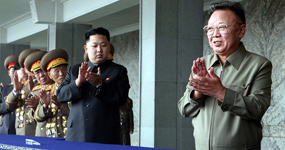
现在,我们面临朝鲜第二次实施的带有敌意的挑衅行为。第一次挑衅——用鱼雷攻击韩国军舰——是暗中进行的:鱼雷来源被刻意掩饰。但后果是明显和令人痛苦的。当前这一次行动显然是公开的。周二的攻击来源无疑是确定的。这是一次肆无忌惮的行动,甚至可以说是一种战争行为。
这引发了一些根本问题。如果这些行动是朝鲜有意为之,那就表明其政权已经有些精神失常。其盘算和行动难以靠理性思维理解。另一种可能是,它表明朝鲜政权已经失控。朝鲜政府的不同部门,包括部分军队,也许不经中央协调就可独自采取行动。这是一种更加不祥的可能性。
那么,世界如何处理这个长期困扰大国、但毫无解决迹象的问题?这里我们进入了另一个不确定领域,因为日益明显的是,我们正在处理的是中美这两个间接涉及但积极参与的大国的不同历史观之间的冲突。
就中国而言,我们在与一个传统上自信的政权打交道。它认为全球实力分布的结构性转变最终将有利于自己。它感觉自己实力在日渐增长,这促使其摆出极大的自我克制、甚至是被动的姿态,不愿改变现状。
另一个关注这些事件的大国——美国则处于非常不同的历史阶段。公众舆论日益认为历史趋势不利于美国。因此美国政府专注于必须做出集体回应,并且对其它国家相对不愿与其分担繁重责任感到沮丧。
让事情更糟的是,从中东到西南亚洲,美国基本上独自陷入了持续十年之久的倒霉冒险。最近,一个完全依赖美国的国家,成功阻碍了美国为中东和平做出的一些重大外交努力。
在这些背景下,我们可能发现自己陷入这样一种境地:中国支持不到位的低调回应,而这只会导致进一步的挑衅行为,而美国可能倾向推动的回应方式,将被中国视为一种危险的过度反应。
重要的是,美国总统巴拉克•奥巴马(Barack Obama)在与中国以及“六方会谈”其它主要国家的合作中,应向全球展示冷静、坚定的个人领导能力。如果我回到白宫情况室,自问能为总统提供什么建议,以下是我会说的。
奥巴马总统必须采取主动。对这种挑衅不能不当一回事,或交给外交官解决。奥巴马应该致电韩国总统李明博(Lee Myung-bak),亲自而直接地再次保证:美国将提供支持。随后他应该致电中国国家主席胡锦涛表示严重关切。他应该致电日本首相菅直人(Naoto Kan)——日本是美国在太平洋的主要盟友,并且毗邻朝鲜。他还应该致电俄罗斯总统德米特里•梅德韦杰夫(Dmitry Medvedev)。随后美国国务卿希拉里•克林顿(Hillary Clinton)应该跟进这些电话,并着手准备将该事件提交至联合国安理会。
朝鲜一直悍然挑战国际社会,其方式是萨达姆•侯赛因(Saddam Hussein)至少不会公然采取的,伊朗也没有这么做。伊朗坚称(或许是在撒谎)其不谋求发展核武器。这是不同类型的挑战——我们的回应必须是坚持让他们拿出证据来。然而,朝鲜有些狂妄,它炫耀自己的核能力,目前又公然挑衅。
我们还必须讨论的是,能否在高科技和能源领域有选择地对朝鲜实施惩罚性的禁运。如果不是朝鲜拥有核武器,并表现出某种疯狂,这本来没什么大不了的。
但关键是,我们不应对中国采取对立的方式。制造大规模的公众敌意既不符合美国的利益,也不符合中国的利益。政府间的分歧是可控的:它们属于正常的国际事务。但如果你挑起公众情绪,此类危机就变得更难控制,也更加危险。
奥巴马致电胡锦涛应该是两个有着共同关切的领导人之间的通话。它不应是美方的要求,也不是警告,而应该是一种认定:我们各自的利益受到影响,做出有效回应符合两国的共同利益。
本文作者曾在1977年至1981年担任美国国家安全顾问
译者/何黎
http://www.ftchinese.com/story/001035712

We are faced today with the second provocative warlike act committed in recent times by North Korea. The first of these, the torpedoing of a South Korean warship, was covert: the origin was deliberately disguised. But the consequences were overt and painful. This current action is clearly overt. The origin of Tuesday’s attack is identified beyond a shadow of doubt. It is an outrageous action that could qualify even as an act of war.
This raises fundamental questions. If these actions are deliberate it is an indication that the North Korean regime has reached a point of insanity. Its calculations and its actions are difficult to fathom in rational terms. Alternatively it is a sign that the regime is out of control. Different elements in Pyongyang, including parts of the military, are capable of taking actions on their own perhaps, without central co-ordination. That is an even more ominous possibility.
So what is the world to do with a problem that has long vexed the major powers without a hint of resolution? Here we enter another realm of uncertainty because it is increasingly apparent that we are dealing with a clash of two alternative historical perspectives between the two major powers indirectly involved and actively engaged, namely the US and China.
In the case of China we are dealing with a regime that is historically self-confident. It perceives tectonic shifts in the distribution of global power as ultimately favourable to its prospects. It senses its power is growing and this leads to a posture of great self- restraint, even passivity and reluctance to rock the boat.
The other major power concerned with these events – the US – is in a rather different historical phase. Public discussion is increasingly dominated by the perspective that historical trends are against America. And so Washington is preoccupied with the need to mobilise a collective response and is frustrated by the relative unwillingness of others to share with it cumbersome responsibilities.
Making matters worse, America is bogged down largely alone in a prolonged decade-long misadventure in an area ranging from the Middle East proper to south-west Asia. More recently, some major US diplomatic efforts to bring peace to the Middle East were successfully defied by a state totally dependent on America.
In these circumstances there is a real risk we may find ourselves in a situation where the Chinese favour an under-reaction that will simply lead to further acts of provocation, and where America may be inclined to push for a response that the Chinese will see as a dangerous overreaction.
It is important that President Barack Obama displays cool, firm and globally visible personal leadership in working with China and the other major parties in the six-party talks. If I were back in the situation room in the White House asking myself what I would advise the president, this is what I would do.
The president has to take the initiative. Provocation of this kind cannot be dismissed lightly or left in the hands of diplomats. He should call President Lee Myung-bak of South Korea to reassure him personally and directly of US support. Then he should call President Hu Jintao of China and express serious concern. He should call Prime Minister Naoto Kan of Japan, as America’s prime ally in the Pacific and given its proximity to the Korean conundrum. He should also call President Dmitry Medvedev of Russia. Hillary Clinton, US secretary of state, should then follow up on these calls and set in motion convening the United Nations Security Council.
North Korea has been defiantly challenging the international community in a way that Saddam Hussein was not, at least overtly, and which the Iranians are not quite doing. The Iranians are maintaining, maybe mendaciously, that they are not seeking nuclear weapons. That is a different kind of challenge in which our response has to be the insistence that they prove their case. The North Koreans, however, are defiant, boasting their nuclear prowess and now openly provocative.
One of the things we have to discuss in these conversations is the possibility of a selectively punitive embargo on North Korea in the area of high-tech and energy. This would be a tempest in a teapot were it not for the fact that Pyongyang has nuclear weapons and some manifestations of insanity in the regime.
Critically, however, our approach to China should not be adversarial. It is not in America’s nor China’s interest to create massive popular hostility. Governmental disagreements can be managed: they are the stock of international affairs. But if you arouse public emotions, such crises become harder to control and dangerous.
A call from Mr Obama to Mr Hu should be a call between leaders who share a concern. It should not be an American demand, nor an admonition. It should be an affirmation that our respective interests are endangered and so we have a common stake in an effective response.
The writer was US National Security Adviser from 1977-1981
http://www.ftchinese.com/story/001035712/en
没有评论:
发表评论